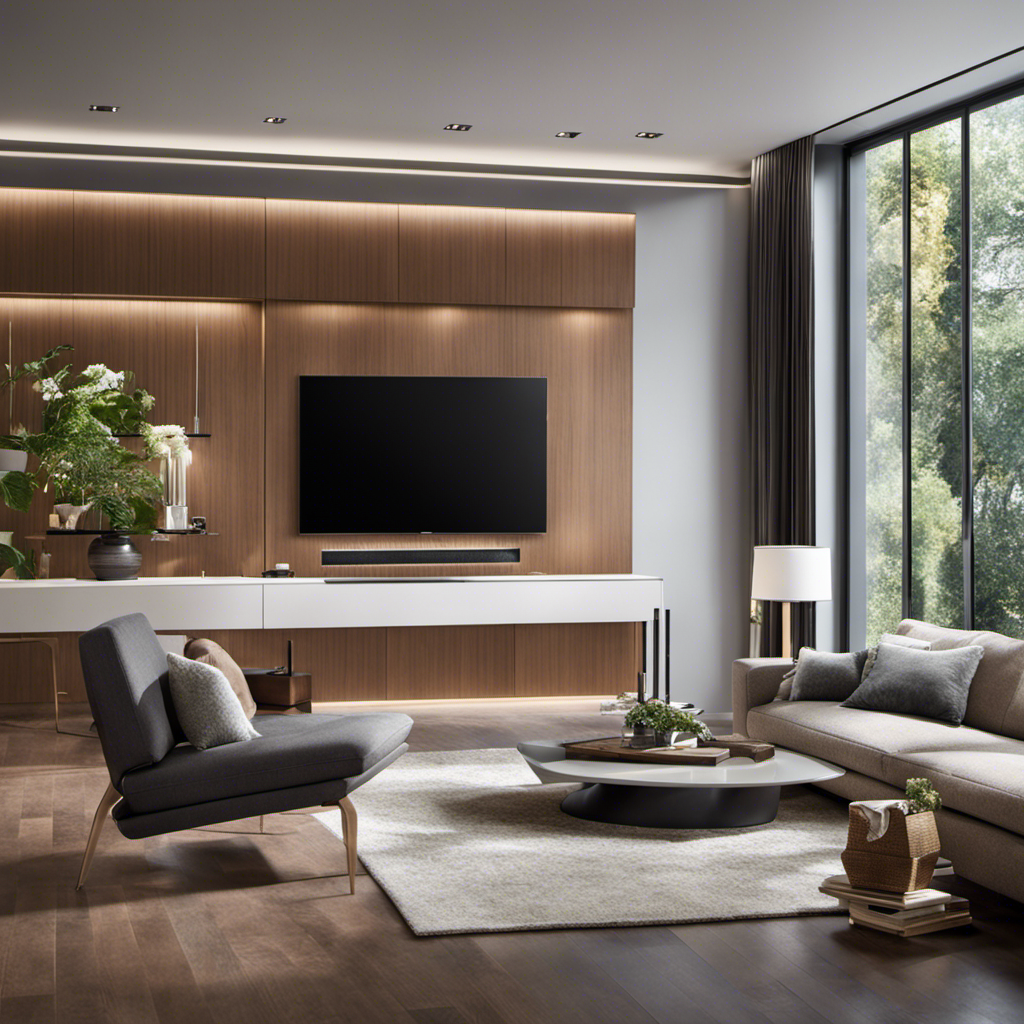In recent years, modern HVAC systems have revolutionized the way we control the temperature and air quality in our homes and businesses. These advanced systems offer a range of advantages, from increased energy efficiency and enhanced temperature control to improved indoor air quality and advanced technology integration.
Not only do they provide cost savings and financial benefits, but they also prioritize environmental friendliness. This article will explore the advantages of modern HVAC systems, catering to an audience that seeks to serve others by providing optimal comfort and well-being.
Key Takeaways
- Increased energy efficiency through the use of smart thermostats and variable refrigerant flow (VRF) technology
- Enhanced temperature control with the ability to remotely control HVAC systems and create different temperature zones
- Improved indoor air quality with advanced air filtration and ventilation systems
- Advanced technology integration allows for remote control, energy monitoring, and optimization of system operation
Increased Energy Efficiency
The increased energy efficiency of modern HVAC systems allows for more cost-effective and environmentally friendly heating and cooling solutions. One key factor contributing to this energy efficiency is the use of smart thermostats. These innovative devices can learn the occupants’ preferences and adjust the temperature settings accordingly, resulting in optimal comfort while minimizing energy wastage.
Additionally, smart thermostats can be controlled remotely through mobile applications, enabling users to manage their HVAC systems even when they are away from home.
Another important feature of modern HVAC systems that enhances energy efficiency is variable refrigerant flow (VRF) technology. VRF systems use advanced refrigerant control to precisely match the cooling or heating demands of individual zones within a building. This allows for better temperature control and reduces the energy consumption of the system. VRF systems also offer the advantage of simultaneous heating and cooling, making them ideal for buildings with varying thermal needs in different areas.
Enhanced Temperature Control
With enhanced temperature control, modern HVAC systems are able to provide precise and customizable heating and cooling options. This is made possible through the integration of smart thermostats and zoning capabilities.
Smart thermostats allow users to remotely control their HVAC systems through their smartphones or other devices, enabling them to adjust the temperature settings even when they are not at home. Additionally, smart thermostats can learn the users’ preferences and automatically adjust the temperature accordingly, ensuring optimal comfort and energy efficiency.
Zoning capabilities further enhance temperature control by dividing the house into different zones, each with its own thermostat. This allows homeowners to set different temperatures for different areas of the house, catering to individual preferences and maximizing energy savings.
Improved Indoor Air Quality
One advantage of modern HVAC systems is their ability to provide improved indoor air quality. With advanced air filtration and ventilation systems, these HVAC systems can effectively remove pollutants, allergens, and contaminants from the air, creating a healthier and more comfortable indoor environment.
Air filtration is a crucial component of modern HVAC systems, as it helps to trap and eliminate particles such as dust, pollen, pet dander, and mold spores. This is especially beneficial for individuals with allergies or respiratory conditions, as it reduces their exposure to potential triggers.
Additionally, ventilation systems in modern HVAC systems help to bring in fresh outdoor air and remove stale indoor air, ensuring proper circulation and preventing the buildup of indoor pollutants.
Advanced Technology Integration
By integrating advanced technology into HVAC systems, a wide range of innovative features and functionalities can be introduced to enhance energy efficiency and user control.
One of the key advancements in modern HVAC systems is smart home integration, which allows homeowners to control their HVAC systems remotely through their smartphones or other smart devices. This integration enables users to adjust temperature settings, monitor energy consumption, and even receive alerts or notifications about system maintenance and performance.
With remote control capabilities, users can conveniently manage their HVAC systems from anywhere, providing increased comfort and convenience. Moreover, this technology integration also enables energy-saving features, such as scheduling and automation, which can optimize the HVAC system’s operation based on the user’s preferences and occupancy patterns.
Cost Savings and Financial Benefits
Implementing modern HVAC systems with advanced energy-saving features can result in significant cost savings and financial benefits for homeowners and businesses. By reducing energy consumption, these systems can lower utility bills, allowing individuals and organizations to allocate their resources more efficiently.
Additionally, modern HVAC systems often require less maintenance compared to older models, leading to reduced maintenance expenses. This means that homeowners and businesses can save money on costly repairs and routine maintenance tasks.
Furthermore, improved energy efficiency can also contribute to environmental sustainability, which is an important consideration for many individuals and organizations today.
Environmental Friendliness
Promoting energy efficiency and reducing carbon emissions are key advantages of modern HVAC systems. These systems offer sustainable solutions that not only provide comfort but also contribute to a greener environment. By implementing energy-efficient technologies, modern HVAC systems help reduce the carbon footprint of buildings, making them more environmentally friendly.
These systems use advanced components and controls that optimize energy usage, resulting in reduced energy consumption and lower greenhouse gas emissions. By choosing a modern HVAC system, individuals and businesses can actively contribute to the global effort of combating climate change.
Moreover, these systems offer sustainable solutions that align with the values of serving others and prioritizing the well-being of both current and future generations.
Frequently Asked Questions
Are Modern HVAC Systems Compatible With Smart Home Technology?
Modern HVAC systems are indeed compatible with smart home technology. This integration allows for seamless control and monitoring of the HVAC system, optimizing energy efficiency and providing convenience for homeowners.
How Do Modern HVAC Systems Contribute to Reducing Carbon Emissions?
Modern HVAC systems contribute to reducing carbon emissions by their ability to reduce energy consumption and improve indoor air quality. They achieve this through features like energy-efficient components, smart thermostats, and advanced filtration systems.
Can Modern HVAC Systems Be Installed in Existing Buildings or Are They Only Suitable for New Construction?
Modern HVAC systems can be installed in both existing buildings and new construction. However, there may be installation challenges and cost considerations associated with retrofitting existing buildings, such as space limitations and the need for additional modifications.
Do Modern HVAC Systems Require Regular Maintenance and Servicing?
Regular maintenance and servicing is essential for modern HVAC systems to ensure optimal performance and energy efficiency. By conducting routine inspections, cleaning, and repairs, potential issues can be identified and resolved, prolonging the lifespan of the system and reducing the risk of breakdowns.
Are There Any Government Incentives or Rebates Available for Installing a Modern HVAC System?
Yes, there are government incentives and rebates available for installing modern HVAC systems. These incentives aim to promote energy savings and encourage individuals to invest in energy-efficient heating, ventilation, and air conditioning systems.


